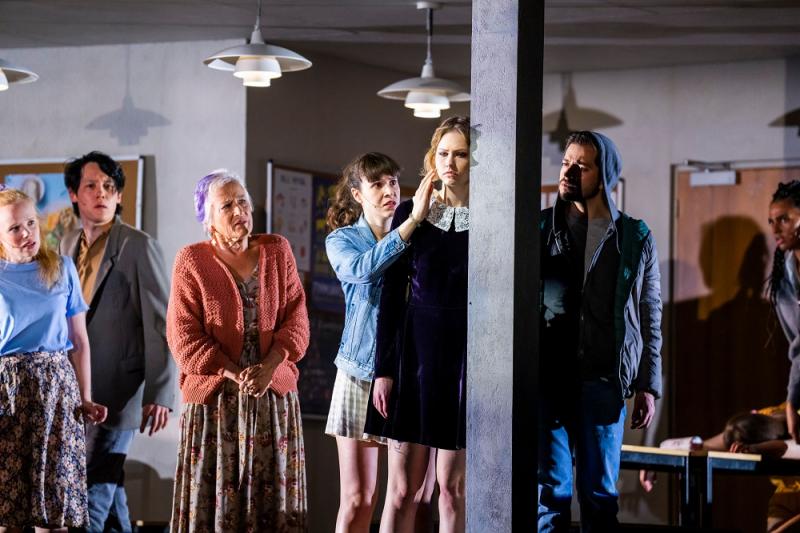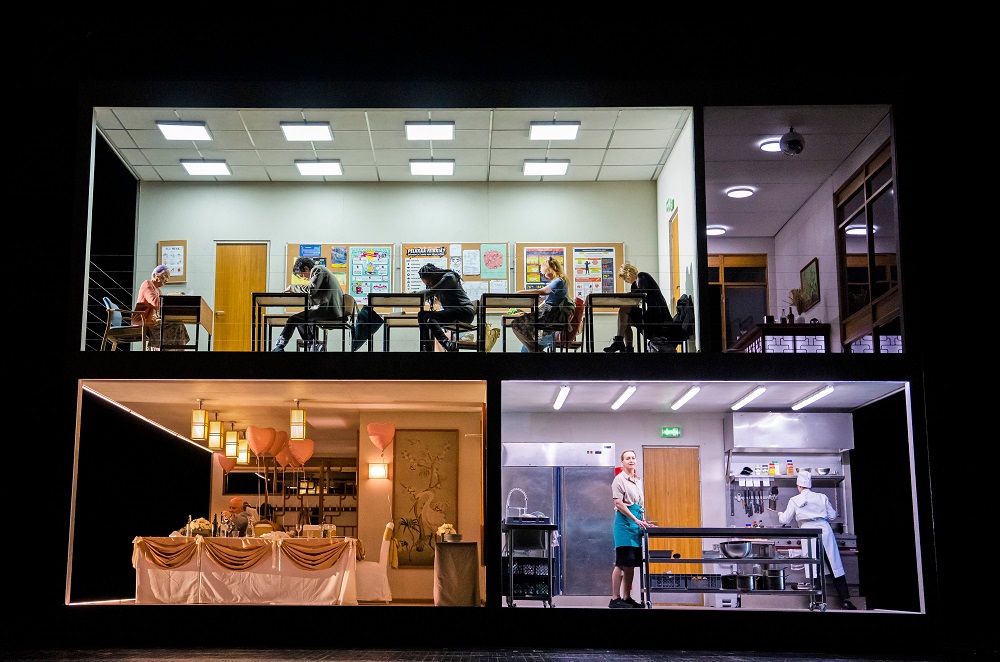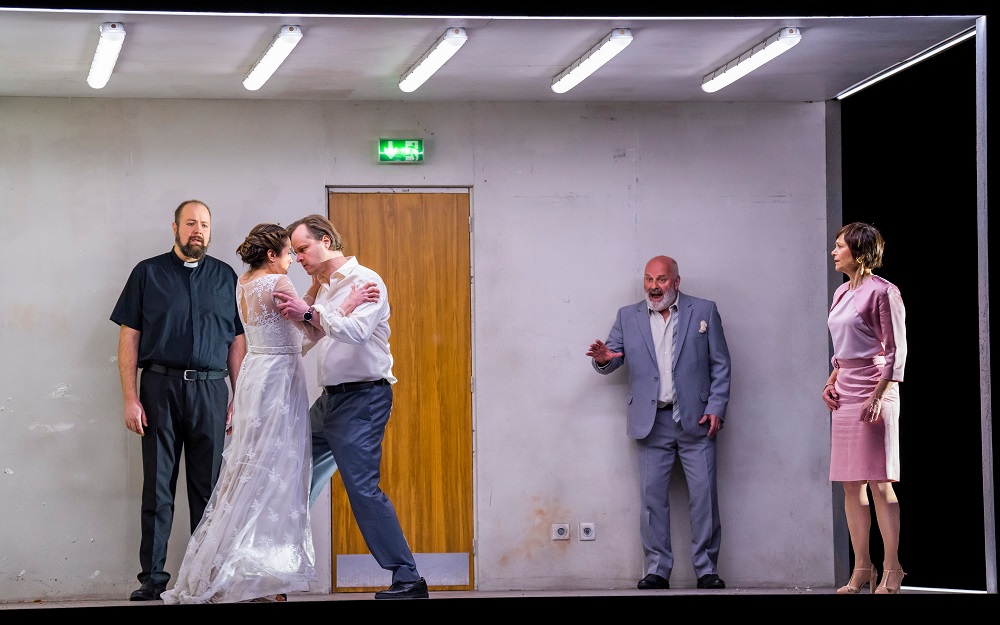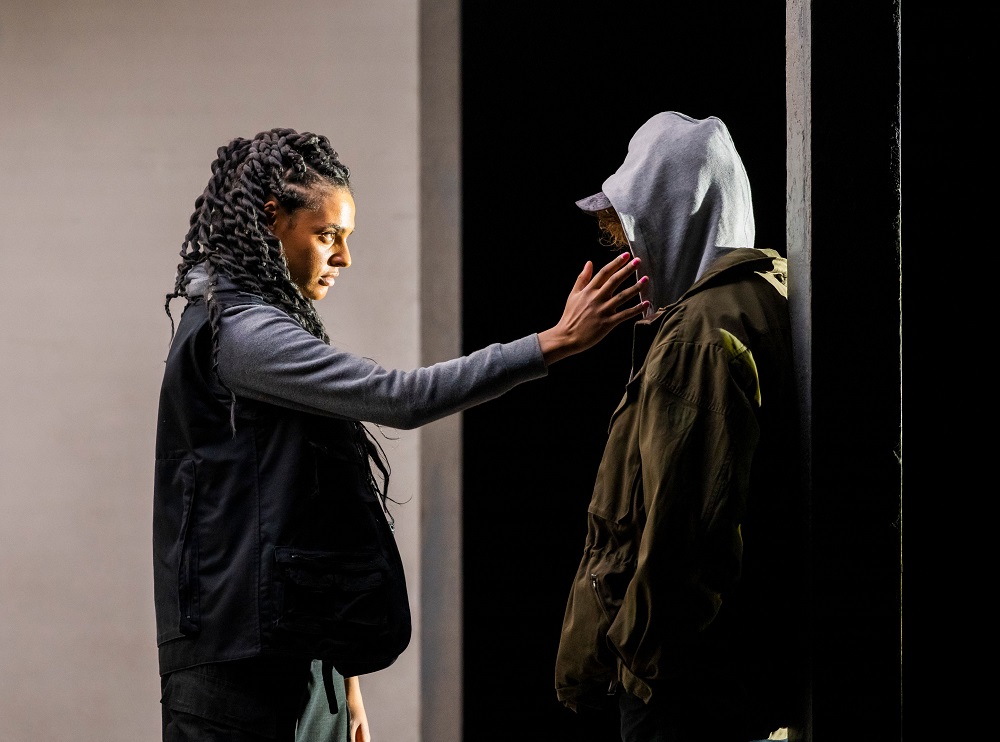Innocence, Royal Opera review - timely, layered drama with almost incidental music | reviews, news & interviews
Innocence, Royal Opera review - timely, layered drama with almost incidental music
Innocence, Royal Opera review - timely, layered drama with almost incidental music
Director Simon Stone does it again, but questions remain about Kaija Saariaho’s score

To create a sensitive and original music-drama around the subject of a school killing is a colossal achievement. Director Simon Stone, set designer Chloe Lamford and novelist Sofi Oksanen’s cutting libretto make Innocence seem like a masterpiece. I wish I were less ambivalent about Kaija Saariaho’s score.
More trenchant than her previous tapestries of bewitching sounds, it's both superbly conducted by Susanna Mälkki and played with absolute assurance by the Royal Opera Orchestra. From the start, bassoons define writhing ideas of the kind we haven’t often encountered in her music before, other wind solos are arresting and the offstage chorus – more fine work by Royal Opera forces – can be haunting. The problem lies in the vocal writing, at least when it’s operatic: awkward mis-stresses in the English – the text is multilingual, for reasons to be explained – and jagged lines which don’t enhance the sense or the pain. An impressive ensemble has been engaged, but only Christopher Purves as the father of the killer we only briefly see completely pulls it off.  Fortunately there’s as much speaking as singing, though Lucy Shelton's teacher Cecilia represents an uneasy halfway house between the two. The framework is as accomplished as everything else in Oksanen’s drama, forged very much in collaboration with dramaturge and translator Aleksi Barrière, who’s responsible for the speaking in tongues: the surviving students, reflecting on how the incident has shaped their lives, come from an international school, so they speak several different languages. It’s not so convincing when the operatic voices switch country, as it were, simply to highlight how this can happen anywhere, even though the setting has to be a Nordic country with its specific social attitudes to the worst transgressions: Finland is not only the place cited (specifically Helsinki), but also the homeland of composer, librettist, conductor and four of the principals, an amazing achievement.
Fortunately there’s as much speaking as singing, though Lucy Shelton's teacher Cecilia represents an uneasy halfway house between the two. The framework is as accomplished as everything else in Oksanen’s drama, forged very much in collaboration with dramaturge and translator Aleksi Barrière, who’s responsible for the speaking in tongues: the surviving students, reflecting on how the incident has shaped their lives, come from an international school, so they speak several different languages. It’s not so convincing when the operatic voices switch country, as it were, simply to highlight how this can happen anywhere, even though the setting has to be a Nordic country with its specific social attitudes to the worst transgressions: Finland is not only the place cited (specifically Helsinki), but also the homeland of composer, librettist, conductor and four of the principals, an amazing achievement.
The present time in which the action, such as it is, begins, sees the celebration of a wedding between Tuomas (tenor Markus Nykänen) and his Romanian bride Stela (Lilian Farahani). The union is vital because Tuomas – and this is revealed early on, so no spoiler in what has to be a selective handling of the drama – is the brother of the school shooter; he’s feared to tell the woman with whom he hopes to make a new start the family’s shameful secret, but it looks as if Stela’s circumstances as an outsider raised in an orphanage could offer him genuine redemption.  Yet since Stela is possibly the only genuinely innocent person among the main characters, the future is anything but assured. While it’s admirable that Saariaho doesn’t ever give way to easy lyricism – and the nearest thing Stela gets to an aria has some arresting trills echoed by the flute – Farahani deserves better in the vocal writing of her various duets and trios with husband, priest (bass Timo Riihonen, as good as he can be) and Tuomas’s parents (Sandrine Piau is luxury casting as the mother-in-law, and dramatically strong, but her rewards, too, are few. Pictured above: Riihonen, Farhani, Nykänen, Purves and Piau).
Yet since Stela is possibly the only genuinely innocent person among the main characters, the future is anything but assured. While it’s admirable that Saariaho doesn’t ever give way to easy lyricism – and the nearest thing Stela gets to an aria has some arresting trills echoed by the flute – Farahani deserves better in the vocal writing of her various duets and trios with husband, priest (bass Timo Riihonen, as good as he can be) and Tuomas’s parents (Sandrine Piau is luxury casting as the mother-in-law, and dramatically strong, but her rewards, too, are few. Pictured above: Riihonen, Farhani, Nykänen, Purves and Piau).
Where there’s tension, rather than reflection, lies not in the flashbacks to what happened at the school – no gun is pointed, no shots fired – but in the late engagement of local woman Tereza (Jenny Carlstedt) as waitress at the wedding. The most striking piece of casting, and vocalisation, rests with ethno-pop singer Vilma Jää as her daughter Markéta: why she’s the only one of the students to have such a singular declamatory voice soon becomes clear. “It’s complicated,” is the best one can say without giving away too much of how the community’s implication in the killing unfolds; suffice it to say that of the international speakers, French-Cameroonian Julia Hega comes to play a very dramatic role (pictured below).  Her character Iris’s later revelation is one of the few points where I actually had goosebumps and a growing sense of dread. The non-linear nature of the storytelling doesn’t often aim for tension, but when it does, Saariaho’s moments of release and horror can seem uncoordinated with the action.
Her character Iris’s later revelation is one of the few points where I actually had goosebumps and a growing sense of dread. The non-linear nature of the storytelling doesn’t often aim for tension, but when it does, Saariaho’s moments of release and horror can seem uncoordinated with the action.
Fortunately Stone pulls off another revelatory piece of direction to follow his Ibsen, Korngold, Wagner and creative takes on Greek mythology (several cast members from his stunning Phaedra, just finished at the National Theatre, were in the audience, and quick to ovate). The dream-like fluidity of paradoxically realistic scene-changes in Lamford’s two-tier revolving box – shades of Katie Mitchell, but much more organic – suits the collage-fantasy of Saariaho’s and Oksanen’s drama to eerie perfection (at first, the composer had thought of calling the work "Fresco"). Is it right that the final sense of catharsis – what Saariaho calls “timid rays of sunshine” – clashes with the composer’s unresolved coldness? I don’t know, but I’ll go on thinking about it for a long time to come. And with the news of yet another horrific teen shooting in America only two days old on the first night, this nuanced artistic achievement could hardly be more necessary.
rating
Explore topics
Share this article
The future of Arts Journalism
You can stop theartsdesk.com closing!
We urgently need financing to survive. Our fundraising drive has thus far raised £49,000 but we need to reach £100,000 or we will be forced to close. Please contribute here: https://gofund.me/c3f6033d
And if you can forward this information to anyone who might assist, we’d be grateful.

Subscribe to theartsdesk.com
Thank you for continuing to read our work on theartsdesk.com. For unlimited access to every article in its entirety, including our archive of more than 15,000 pieces, we're asking for £5 per month or £40 per year. We feel it's a very good deal, and hope you do too.
To take a subscription now simply click here.
And if you're looking for that extra gift for a friend or family member, why not treat them to a theartsdesk.com gift subscription?
more Opera
 Tosca, Welsh National Opera review - a great company reduced to brilliance
The old warhorse made special by the basics
Tosca, Welsh National Opera review - a great company reduced to brilliance
The old warhorse made special by the basics
 BBC Proms: The Marriage of Figaro, Glyndebourne Festival review - merriment and menace
Strong Proms transfer for a robust and affecting show
BBC Proms: The Marriage of Figaro, Glyndebourne Festival review - merriment and menace
Strong Proms transfer for a robust and affecting show
 BBC Proms: Suor Angelica, LSO, Pappano review - earthly passion, heavenly grief
A Sister to remember blesses Puccini's convent tragedy
BBC Proms: Suor Angelica, LSO, Pappano review - earthly passion, heavenly grief
A Sister to remember blesses Puccini's convent tragedy
 Orpheus and Eurydice, Opera Queensland/SCO, Edinburgh International Festival 2025 review - dazzling, but distracting
Eye-popping acrobatics don’t always assist in Gluck’s quest for operatic truth
Orpheus and Eurydice, Opera Queensland/SCO, Edinburgh International Festival 2025 review - dazzling, but distracting
Eye-popping acrobatics don’t always assist in Gluck’s quest for operatic truth
 MARS, Irish National Opera review - silly space oddity with fun stretches
Cast, orchestra and production give Jennifer Walshe’s bold collage their all
MARS, Irish National Opera review - silly space oddity with fun stretches
Cast, orchestra and production give Jennifer Walshe’s bold collage their all
 Káťa Kabanová, Glyndebourne review - emotional concentration in a salle modulable
Janáček superbly done through or in spite of the symbolism
Káťa Kabanová, Glyndebourne review - emotional concentration in a salle modulable
Janáček superbly done through or in spite of the symbolism
 Buxton International Festival 2025 review - a lavish offering of smaller-scale work
Allison Cook stands out in a fascinating integrated double bill of Bernstein and Poulenc
Buxton International Festival 2025 review - a lavish offering of smaller-scale work
Allison Cook stands out in a fascinating integrated double bill of Bernstein and Poulenc
 Tosca, Clonter Opera review - beauty and integrity in miniature
Happy surprises and a convincing interpretation of Puccini for today
Tosca, Clonter Opera review - beauty and integrity in miniature
Happy surprises and a convincing interpretation of Puccini for today
 Hamlet, Buxton International Festival review - how to re-imagine re-imagined Shakespeare
Music comes first in very 19th century, very Romantic, very French operatic creation
Hamlet, Buxton International Festival review - how to re-imagine re-imagined Shakespeare
Music comes first in very 19th century, very Romantic, very French operatic creation
 Falstaff, Glyndebourne review - knockabout and nostalgia in postwar Windsor
A fat knight to remember, and snappy stagecraft, overcome some tedious waits
Falstaff, Glyndebourne review - knockabout and nostalgia in postwar Windsor
A fat knight to remember, and snappy stagecraft, overcome some tedious waits
 Salome, LSO, Pappano, Barbican review - a partnership in a million
Asmik Grigorian is vocal perfection in league with a great conductor and orchestra
Salome, LSO, Pappano, Barbican review - a partnership in a million
Asmik Grigorian is vocal perfection in league with a great conductor and orchestra
 Semele, Royal Opera review - unholy smoke
Style comes and goes in a justifiably dark treatment of Handelian myth
Semele, Royal Opera review - unholy smoke
Style comes and goes in a justifiably dark treatment of Handelian myth

Add comment